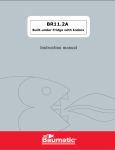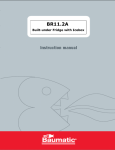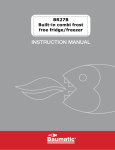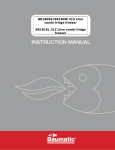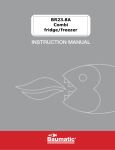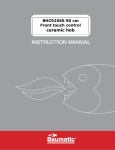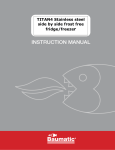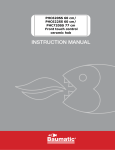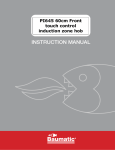Download Baumatic BR11.2ALH User manual
Transcript
BR11.2A / BR11.2ALH Built under Fridge with icebox 33U d USER MANUAL FOR YOUR BAUMATIC BR11.2A / BR11.2ALH Built under fridge with icebox NOTE: This User Instruction Manual contains important information, including safety & installation points, which will enable you to get the most out of your appliance. Please keep it in a safe place so that it is easily available for future reference. for you or any person not familiar with the operation of the appliance. GS 18/10/10 2 Contents Environmental note 4 Important safety information 5–6 Specifications of your larder fridge Specifications Dimensions Description of the appliance Description of the product features 7 – 10 7 7 8 9 - 10 Using your Baumatic larder fridge Before switching on During first use Turning on the appliance and setting the thermostat 10 - 11 10 10 11 Arranging and storing food in your refrigerator 12 - 13 Arranging and storing food in your ****freezer compartment Making ice-cubes 13 – 14 14 - 15 Saving energy when using your fridge-freezer 15 - 16 Cleaning and maintenance Defrosting the refrigerator compartment Defrosting the freezer compartment Cleaning of the condenser Periodical cleaning of the condenser Replacing the light bulb 17 - 20 17 - 18 18 18 – 19 19 20 Installation Electrical connection Positioning Aperture dimensions Adjusting the height and levelling off your larder fridge Installing your refrigerator Installing the kitchen cabinet door Fastening the refrigerator to the worktop Reversing the refrigerator door Reversing the freezer compartment door 20 20 21 22 23 24 25 27 28 29 Troubleshooting 30 - 31 Contact details 32 - 29 - 21 - 22 – 25 – 26 3 Environmental note Note: Before discarding an old appliance, switch off and disconnect it from the power supply. Cut off and render any plug useless. Cut the cable off directly behind the appliance to prevent misuse. This should be undertaken by a competent person. Disable the door lock to make sure that children cannot get stuck inside the appliance. 4 Important safety information Your safety is of the utmost importance to Baumatic. Please make sure that you read this instruction booklet before attempting to install or use the appliance. If you are unsure of any of the information contained in this booklet, please contact the Baumatic Advice Line. IMPORTANT: Any installation work must be carried out by a qualified electrician or competent person. Use of the appliance o Your appliance is only designed to be used in the home. It is suitable for storing food that needs to be chilled and refrigerated. If it is used for any other purpose or it is not used correctly, then Baumatic Ltd. will accept no liability for any damage that might be caused. o Altering the specification of the appliance must not be attempted for reasons of safety. Before using your appliance o Check the appliance for any signs of transport damage. If you notice any damage, then you should not connect your appliance to your mains supply and should contact your supplier. Refrigerant o Your appliance contains R600a refrigerant, which is a natural gas that does not contain CFCs that can damage the environment. However it is a flammable substance, therefore care should be taken: During the transportation and installation of the appliance, make sure that the refrigeration pipework does not get damaged. If it does become damaged then sources of ignition and open flames should be avoided. Also the room that the appliance is situated in should be thoroughly ventilated. o Do not place any objects on top of the appliance, as this may damage the table top. 5 Child safety o Packaging material should be kept away from children. o Children should not be allowed to touch the controls or play with the appliance. General safety o Do not pull on the power supply cable to remove the plug from your mains supply socket. o Do not pull out or insert the plug with wet hands. o Do not attempt to use your appliance outdoors or any place where it is likely to come into contact with the elements. o Before cleaning the appliance or performing maintenance work, ensure that the appliance disconnected from your mains supply. has been o Never allow the back coils of the appliance to come into contact with the wall surface. o Always ensure that the location where you are installing your appliance is free of stored items such as papers and other flammable materials. o Never block the ventilation openings of the appliance, either on the inside or its exterior. o It is vital to keep your appliance well ventilated, so that there is proper air flow between the bottom of the unit and the plinth/kick plate which it is sitting on. o Do not place electrical devices inside of the appliance, such as mixers and electric ice cream makers. Service You should not attempt to repair the appliance yourself, as this could cause injury or a more serious malfunction. If you require a service call then please contact the Customer Care Department. 6 Specifications of your larder fridge o o o o o o o o o o o o o o o Total gross / net capacity: 130 / 126 litres Gross capacity fridge / icebox: 109 / 21 litres Net capacity fridge / icebox: 105 / 21 litres Freezing capacity: 2 kg / 24 hours Automatic defrost (fridge) Adjustable thermostat Egg rack 2 safety glass shelves Salad crisper Bottle rack Butter and cheese compartment **** Freezer compartment Reversible door Door-on-door fittings Adjustable feet Dimensions of appliance Dimensions of aperture* Height: Width: Depth: Height: Width: Depth: 818 - 898 mm 596 mm 545 mm 820mm-900mm 600 mm (min) 550 mm (min) 7 Energy efficiency class Energy class: A * Please refer to the installation instructions for more specific information on the size of aperture that you will require. IMPORTANT: When you install your appliance it is important to bear in mind its climatic rating. In order to find out the climatic rating of your appliance, you should check the rating plate. The rating plate is located on the front left edge of the inside of the fridge. You will need to open the door of your appliance to be able to find it. The rating plate will indicate the ambient temperature range that your appliance will function correctly within. Description of the appliance A) Refrigerator section B) **** Freezer compartment 1) Safety shelves 2) Defrost water outlet 3) Salad crisper 8 Description of the product features 1) Shelves o The shelves may be placed in any of the guide slots within the interior of the appliance. They are protected from sliding out. o To alter the shelf position: Lift the shelf and pull it towards you until it reaches the crack in the guide slot. At the guide interruption point, the shelf may be adjusted to the height of your choice. Push the shelf all the way in to the rear end of the guide slot. o To remove a shelf: Lift the shelf and pull it towards you (1) until it reaches the crack in the guide slot. At the guide interruption point, lift the left side of the shelf up (2) and pull it out from the appliance in the inclined position (3). Reinsertion is carried out in the opposite procedure. 2) Defrost water outlet o The interior of the refrigerator is cooled by the cooling plate that is on the rear wall. Beneath this there is a channel and an outlet for the defrost water. o It is important that this channel never becomes clogged (see “Defrosting the refrigerator compartment” for a detailed explanation of how to keep the channel clear). 3) Crisper drawer and cover o The crisper drawer is in the bottom of your refrigerator and there is a cover that goes over it. o The cover helps to prevent fruit and vegetables from drying out prematurely. 4) Butter compartment o The butter compartment should only be used for storing packs of butter or margarine. 9 5) Bottle shelf o The lower shelf should be used for storing reasonably sized bottles. IMPORTANT: IT IS IMPORTANT THAT NONE OF THE SHELVES THAT SIT IN THE DOOR ARE OVERLOADED, AS THIS WILL DRASTICALLY REDUCE THEIR WORKING LIFE. Using your Baumatic larder fridge Before switching on o Make sure that it has been installed by a suitably qualified person, as per the information contained in Baumatic’s installation instructions. o After delivery, wait for eight hours before connecting the appliance to your mains supply. This will allow any refrigerant gasses that may have been disturbed during the transportation process to settle. o The outside of the appliance and the removable accessories contained within it, should be cleaned with a solution of liquid detergent and water. o The interior of the appliance should be cleaned with a solution of sodium bicarbonate dissolved in lukewarm water. The interior and accessories should be thoroughly dried, after the cleaning process has been completed. o There can be an odour when you first switch on the appliance. It will lessen as the appliance starts to cool. During first use o When you first switch on the appliance, the compressor will run continuously for approximately 24 hours or until the refrigerator reaches a cool enough temperature. o During this period of time, you should try not to open the door frequently or place a large amount of food in the appliance. o If the unit is switched off or unplugged, you must allow at least 5 minutes before restarting the appliance with the thermostat or connecting it to your mains supply. 10 Turning on the appliance and setting the thermostat You switch on your appliance by connecting it to your mains supply and setting the thermostat. The thermostat control dial is located on the upper right hand side of the fridge interior. The control knob should be rotated in a clockwise direction. o The thermostat automatically regulates the temperature inside of the fridge, depending on what number you have turned the thermostat control knob to:o Position <0> means that the appliance will not cool. However the light will still function. o Position <1> will give you a higher temperature inside of the fridge. o Position <7> will give you a lower temperature inside of the fridge. o Ideally the thermostat should be set to a position of between <3> to <4>. o Your refrigerator can maintain a temperature of between 4 – 6 degrees centigrade. o IMPORTANT: The ambient temperature of the room, the temperature of the food and the amount of food that has been placed in the appliance and how often the door is opened, will all affect the temperature being maintained by the appliance. o On the maximum setting (position <7>), your fridge will work harder to maintain a lower temperature. There is no need to run your appliance on this setting for prolonged periods and you should return the thermostat knob to between <3> to <4>. o IMPORTANT: Do not run the appliance with the thermostat above number 5 in normal usage otherwise the defrost drainage hole will freeze. 11 Arranging and storing food in your refrigerator o Warm food or evaporating liquids should not be stored in your refrigerator, as this will increase the humidity inside of the appliance. o All foods should be wrapped or covered, this is particularly important if the food has a strong flavour. You should use polythene bags or sheets, aluminium foil, wax paper. Liquids should be stored in covered containers or bottles. o To maximise the space inside of your refrigerator, any excessive packaging on the food should be removed. o Quickly perishable food should be stored at the back of the refrigerator, which is the coldest part of the appliance. o No food items should be allowed to come into contact with the back wall of the refrigerator. o Make sure that you arrange food in such a way that the door can close completely. Particular attention should be given to bottles that may protrude when placed on shelves inside the main section of the refrigerator. o Some organic solutions, such as the oils in lemon/orange peel and acid in butter, can cause damage to the plastic parts contained inside of the refrigerator. o Do not open the refrigerator door too often or leave the door open for long periods of time, as this will increase the temperature inside of the appliance. o Meat should be wrapped in polythene bags and then placed on the glass shelf above the salad drawer. (Meat should only be stored in this manner for one or two days at the most). o Cold dishes/cooked food should be covered and can be placed on any shelf. o Fruit and vegetables should be cleaned thoroughly and placed in the salad drawer. o Cheese and butter should be placed in airtight containers, or they can be wrapped in aluminium foil or polythene bags. As much air as possible should be removed from the bags. 12 o Milk bottles should have a cap on them and be stored on the bottle shelf that sits in the door. o Garlic, potatoes, onions and bananas should only be stored in a refrigerator IF they are stored in airtight containers. Recommended food storage times in the refrigerator Food item Recommended storage time (days) Butter 7 Eggs 10 Meat: Fresh uncut 2 Chopped 1 Smoked 10 Fish 1 Marinade 10 Root 8 Cheese 4 Sweets 2 Fruit 2 Prepared dishes 2 Arranging and storing food in your **** freezer compartment Freezing fresh foods o Carefully select the food you intend to freeze. It should be of adequate quality and suitable for freezing. o Use the correct packaging and wrap it right. The packaging should be air tight and should not leak as this could cause substantial vitamin loss and dehydration of foods. Foils and bags should be soft enough to tightly wrap around the foods. o Clearly mark packages with the kind and amount of foods and the date of freezing. o It is most important that the food is frozen as quickly as possible. Therefore it is recommended that the size of the package is not too large and the food is cooled before loading it into the freezer. o The amount of fresh foods that can be loaded in the freezer within 24 hours is 2 kg. If the loaded amount is too large, the quality of freezing is reduced which affects the quality of the frozen foods. 13 Defrosting frozen food o Partially thawed or defrosted foods should be used as soon as possible. Cold air preserves the food but it does not destroy microorganisms which rapidly activate after defrosting and make foods perishable. o Partial defrosting reduces the nutritional value of especially of fruits, vegetables and ready-made meals. foods, Storing frozen foods o The storage time and recommended temperature for storing commercially frozen foods are indicated on the packaging. You should always consult the manufacturer’s instructions. o When shopping, be careful and choose only adequately packed foods provided with complete data and stored in freezers where the temperature is not higher than 18°C. o Do not buy packages of food covered with a frost layer. This indicates that the package was thawed before at least once. Be careful that packages don’t start to thaw as the temperature rise reduces the quality of the foods. Recommended storage time for frozen foods Food item Recommended storage time (months) Vegetables 10 Fruit 12 Bread / Pastries 3 Milk 3 Ready-made meals 3 Meat: Beef 12 Veal 10 Pork 6 Poultry 10 Game 8 Minced meat 4 Smoked sausages 1 Fish: Lean 3 Fat 1 Offal 2 How to make ice-cubes o The recommended thermostat position for making ice-cubes is on the middle setting. 14 o Fill 2/3 of an ice-tray with cold water. Insert the ice-tray into the guides or on the cooling plate of the freezer compartment. o The time required for the ice to form largely depends on the ambient temperature, thermostat setting and on how often the door is opened. It usually takes 2-6 hours. o The easiest way to empty the ice-tray is to turn the tray around and pour it with cold water and slightly twist and bend it. Saving energy when using your fridge-freezer Installing: o Install the appliance in a cool position. If it is placed in direct sunlight or next to an oven or other heat source, the energy consumption can increase substantially. o Ensure the appliance is installed with the correct ventilation requirements. Restricting ventilation can increase the energy consumption by 15%. Cleaning and Maintenance: o Occasionally clean the condenser coils (if present) at the back of the appliance to maintain a high performance level. o Defrost the freezer compartment regularly. A build up of thick ice decreases the efficiency of the appliance. You should defrost whenever the frost reaches 5 mm thickness. o Clean the door gasket with warm water or a neutral detergent that leaves no residue. A tight-sealing door gasket is critical to the efficiency of your appliance. Usage: o Do not open the door repeatedly or more frequently than you have to. 15 o Do not set the thermostat too low. A change of just one degree can effect the energy consumption by 5%. Use a thermometer to check the temperature. o The freezer compartment should operate at -15 to -18 degrees Celsius. The refrigerator should operate at around 3 to 4 degrees Celsius. o Allow food to sufficiently cool before putting it in the appliance (but don’t let it sit at room temperature for too long). o In the freezer compartment, food packages should be scattered and never grouped or stacked together until they are completely frozen. o If you are going away for a long period of time, turn off the appliance, empty and clean it and leave the door ajar. o If you have a second appliance that is not used, make sure that it is stored with the power off and the door left ajar until it is actually required. Disposing: o If you're going to throw out your old fridge, see if there's a chlorofluorocarbons (CFCs) recycler in your area. The government department which looks after the environment in your area may be able to help you. 16 Cleaning and maintenance WARNING: PLEASE ENSURE THAT YOUR APPLIANCE IS DISCONNECTED FROM YOUR MAINS SUPPLY BEFORE ATTEMPTING TO CLEAN IT. o Do not clean the appliance by pouring water onto it or spraying water over it. o The refrigerator compartment should be cleaned periodically, using a solution of bicarbonate of soda and lukewarm water. o Clean the accessories separately with soap and water. Do not clean them in a dishwasher. o Do not use abrasive products, detergents or soaps. o After washing the appliance, wipe over the area that you have cleaned with a damp cloth and then dry it thoroughly. o When cleaning is complete, dry your hands and then reconnect the plug to your mains supply. Defrosting the refrigerator compartment o Defrosting occurs automatically in the refrigerator section during operation. The defrost water is collected by the evaporating tray and evaporates automatically. o The evaporating tray and defrost water drain hole should be cleaned periodically with the defrost drain plug. This will prevent water from collecting in the bottom of the refrigerator, instead of flowing down the defrost drainage channel and drain hole. o You can also pour a small amount of water down the drain hole to clean inside of it. 17 o You should be careful to make sure that food packages do not touch the rear wall of the appliance, as this can interrupt the automatic defrosting process and deflect water into the base of your refrigerator. Defrosting the freezer compartment o When the frost and ice layer in the freezing compartment is 3-5 mm thick, you should clean the freezer. o Turn the thermostat control knob to the STOP (0) position and disconnect the power supply. Empty the compartment and take care that the packages remain frozen. o Any melted water that collects at the bottom of the appliance should be mopped with an absorbing cloth. o Avoid using defrosting sprays as they may cause damage to the plastic parts and may be hazardous to health. Cleaning of the condenser IMPORTANT: Always disconnect the appliance from the power supply before carrying out any cleaning procedure. o Excessive dust upon the condenser is signalled by the sound of an alarm, which is audible when the door is opened until the fault is removed. To remove the dust you should: o Push your finger through the opening in the bottom rail and release the fastener. Pull the rail towards you and remove it. o Remove the bottom board of the kitchen cabinet and pull the condenser dish out. Use the vacuum cleaner to clean the dust from the condenser. o Replace the condenser dish and the bottom rail in the opposite order. 18 Periodical cleaning of the condenser IMPORTANT: Always disconnect the appliance from the power supply before carrying out any cleaning procedure. o In order to optimise the operation of the appliance and save energy, it is recommended to periodically clean the dust from the condenser at the back of the appliance. o Empty the contents of the appliance. o Remove the supporting panel from the bottom of the kitchen cabinet. o Remove the screws fixing the appliance to the kitchen worktop. o Pull the appliance out and expose the condenser at the back of the appliance. o Unscrew the screws from the condenser bonnet and remove the bonnet. o Clean the dust and dirt from the condenser. After cleaning, return the appliance to its place and plug in the mains power cord. 19 Replacing the light bulb WARNING: PLEASE ENSURE THAT YOUR APPLIANCE IS DISCONNECTED FROM YOUR MAINS SUPPLY BEFORE ATTEMPTING TO REPLACE THE LIGHT BULB. o Press the cover at the rear side (1) and remove the plastic cover (2). o Replace the bulb with an E14, max. 15W bulb type. o Replace the cover. Installation IMPORTANT: Before installation and usage read all the instructions and make sure that the voltage (V) and the frequency (Hz) indicated on the rating plate are exactly the same as the voltage and frequency in your home. The rating plate can be found on the front left edge of the inside of the refrigerator. The manufacturer declines all responsibility in the event of the installer failing to observe all the accident prevention regulations in force, which are necessary for normal use and the regular operation of the electric system. Electrical connection YOUR REFRIGERATOR IS INTENDED FOR FITTED AND PERMANENT INSTALLATION. We recommend that the appliance is connected by a qualified electrician, who is a member of the N.I.C.E.I.C. and who will comply with the I.E.E. and local regulations. 20 o Your refrigerator comes supplied with a 13 amp plug fitted. If in future you need to change the fuse in this plug, then a 13 amp ASTA approved (BS 1362) fuse must be used. o The wiring in the mains lead is coloured as follows: Brown Live Blue Neutral Green and yellow Earth o As the colours of the wires in the appliance’s mains lead may not correspond with the coloured markings identifying the terminals in your spur box, please proceed as follows: The brown wire must be connected to the terminal marked “L” (live), or coloured red. The blue wire must be connected to the terminal marked “N” (neutral), or coloured black. The green and yellow wire must be connected to the terminal marked “E” (earth), or by the earth symbol, or coloured green and yellow. o When the connection is completed, no stray strands or cut wire should be present. The cord clamp must be secured over the outer sheath. Positioning o It is advisable that your appliance is only installed in a location where the ambient temperature of the room, corresponds with the climate classification that is stated on the rating plate of your appliance. Your appliance may not function correctly if the ambient temperature falls outside of the following ranges. Climate classification Appropriate ambient temperature SN +10 to +32 degrees centigrade N +16 to +32 degrees centigrade o Your appliance should not be located in direct sunlight or exposed to continuous heat or extremes of temperature (e.g. next to a radiator or boiler). o The door should be able to open completely and freely o The appliance should be situated so you can easily access the food that is stored in it. 21 o You should check whether there is an electrical socket available, which will be accessible after your appliance is installed. o IMPORTANT: To allow the door of the appliance to open without fouling the unit that is next to it. Aperture dimensions o The diagram above shows the aperture size that you will need to be able to install your appliance. o The appliance must be stood on a level floor. You can use the levelling feet to take into account any minor unevenness in the floor. 22 Adjusting the height and levelling off your larder fridge o The appliance is equipped with four adjustable legs, so that the height may be adjusted from 82 to 90 cm. o The height must be adjusted prior to building the appliance into the opening slot and it should be set at such a height that the top panel of the appliance fits exactly below the kitchen worktop. IMPORTANT: If the appliance is not level, then the door and door seal may be affected. IMPORTANT: Do not move the appliance when the feet are adjusted high. 23 Installing your refrigerator o You need to ensure you leave the ventilation spaces marked in the diagram above. o Ensure there is a sufficient space behind the cooling coils at the back of your fridge. o After removing the rear wall of the cabinet, push the appliance into the kitchen unit’s space and allow at least 4 mm free space on both sides between the appliance and the side walls of the kitchen unit. Allow 38 mm space between the back of the fridge and the wall. 24 Installing the kitchen cabinet door o Using a 2.8 mm diameter bit, make holes sufficient to attach the hanging rail as shown in the diagram above. There must be enough door space left below the hanging rail to ensure the door reaches to just below the appliance. o In order to work out the amount of door space to leave above the hanging rail you should take measurement A, from the refrigerator bar shown in the diagram above, to the underside of the kitchen worktop. Then take measurement B from the underside of the kitchen worktop to the top of the adjacent kitchen cabinet. You should then subtract measurement B from 25 measurement A to obtain the correct door space to leave above the hanging rail. o Fix the hanging rail onto the inside of the décor door using two 10 mm screws, centering it so that 262 mm of its width is on either side of the imaginary vertical middle line of the décor door as shown in the illustration above. o Clasp the eyelet holes in the hanging rail on the inside of the décor door over the bolts protruding from the top edge of the refrigerator door. o Secure these using the nut caps provided, as shown in the illustration above. Ensure that you have the décor door attached levelly before you proceed to the lower fastenings. o Fasten the door holder cover into the top of the refrigerator door as shown in the above diagram. 26 Fastening the refrigerator to the worktop o Drill two holes into the underside of the worktop in accordance with those at the top of the refrigerator. Attach the fridge to the worktop as shown in the diagram above. o Finally, place the plinth fascia over the area at the base of the appliance, as indicated by the arrows in the diagram to the left. o Gently push the plinth fascia until it slots into place. 27 Reversing the refrigerator door For your convenience, the direction that the refrigerator door opens from can be reversed by following the steps outlined below. IMPORTANT: This procedure should only be carried out when the appliance is unplugged from the mains supply and the refrigerator cavity is empty. o On the hinge-less side of the fridge door, remove the caps (1) that cover the hinge bracket holes. Keep these in a safe place nearby. o Remove the upper hinge (2) using a star-head screwdriver to remove the screws. o Detach and remove the lower hinge (3) doing the same as you have to the top hinge. o Flip the top hinge and bring it over and down to the bottom corner that is diagonally opposite to it (4). Screw it in. o Flip the bottom hinge and bring it over and up to the top corner that is diagonally opposite to it (5). Screw it in. o Attach the door to the doorway, ensuring that all the holes where the hinges had formerly been screwed into are now covered with the caps you had previously removed. 28 Reversing the freezer compartment door For your convenience, the direction that the ice box door opens from can be reversed by following the steps outlined below. IMPORTANT: This procedure should only be carried out when the appliance is not plugged into the mains supply and when foods and heavy amounts of frost are absent from the interior. o Open the freezer compartment door o Using a screwdriver, remove the two screws fixing the door latch to the doorway. o Remove the door latch. o Taking a screwdriver, remove the screw pinioning the lower hinge to the door. o Remove the door, turn it so it is fully upside-down to how it had been but do not flip the door so that the inside is now facing outwards. o Flip the hinge so that it will go into the other side. Attach it by screwing it in. o Holding the door in place, reattach the hinge to the other side using the screws you have kept. 29 Troubleshooting IMPORTANT: If your refrigerator appears not to be operating properly, before contacting the Customer Care Department, please refer to the checklist below. My fridge does not appear to be working/there is no power to my appliance. o Check that the plug is fully inserted into the power socket. o Check that there is power to your mains supply (e.g. that there hasn’t been a power cut or that the fuse hasn’t blown). o Check that the thermostat inside the appliance has not been turned to the off position. o Check that your mains supply voltage, corresponds to the voltage stated on the rating plate of your appliance. My fridge appears to be performing poorly o Check that the appliance isn’t overloaded and that food hasn’t been packed too tightly into it. o The thermostat setting is too low; you should turn the thermostat up higher. o Ensure that the door is closing properly and that the door has not been opened for a prolonged period in error. o Ensure that there is adequate ventilation for your appliance. My fridge is noisy o The refrigerant gas that circulates the pipework of the appliance may make a slight noise, even if the compressor is not running. o If the noise worsens or the appliance gets louder than normal; check that it is levelled off correctly, that nothing is touching the rear of the fridge and that nothing placed inside the appliance is rattling. 30 Ice has formed on the inner back wall of my fridge o Check that food has not been pushed too far back inside the appliance, so that it is in contact with the inner back wall. There is water in the base of the fridge or leaking out of my fridge. o Follow the “Defrosting the refrigerator compartment” section on page 17. An alarm can be heard whenever the refrigerator door is opened. o An alarm signals when the condenser needs cleaning. To remove the dust follow the steps outlined in the “Cleaning of the condenser” section on pages 17 - 19. IMPORTANT: If your appliance appears not to be operating correctly, then you should disconnect it from your mains supply and then contact Baumatic Customer Care on telephone number (0118) 933 6911. DO NOT ATTEMPT TO REPAIR THE APPLIANCE YOURSELF. Please note that if an engineer is asked to attend whilst the product is under guarantee and finds that the problem is not the result of an appliance fault, then you may be liable for the cost of the call out charge. The appliance must be accessible for the engineer to perform any necessary repair. If your appliance is installed in such a way that an engineer is concerned that damage will be caused to the appliance or your kitchen, then he will not complete a repair. This includes situations where appliances have been tiled in, sealed in with sealant, have wooden obstructions placed in front of the appliance, like plinths. Or any installation other than the one specified by Baumatic Ltd. has been completed. Please refer to the conditions of guarantee that appear on the warranty card that you receive with the appliance. 31 United Kingdom Baumatic Ltd., Baumatic Buildings, 6 Bennet Road, Reading, Berkshire RG2 0QX United Kingdom Sales Telephone (0118) 933 6900 Sales Fax (0118) 931 0035 Customer Care Telephone (0118) 933 6911 Customer Care Fax (0118) 986 9124 Spares Telephone (01235) 437244 Advice Line Telephone (0118) 933 6933 E-mail: [email protected] [email protected] [email protected] [email protected] Website: www.baumatic.co.uk Republic of Ireland Service Telephone 1-890 812 724 Spares Telephone 091 756 771 Czech Republic Baumatic CR spol s.r.o. Průmyslová zóna Sever 696 460 11 Liberec 11 Czech Republic +420 483 577 200 www.baumatic.cz Slovakia Baumatic Slovakia, s.r.o. Galvániho 7/D Slovakia +421 255 640 618 Germany Baumatic Gmbh Lilienthalstrasse 1 320 52 Herford Deutschland +49 5221 694 99-0 www.baumatic.de Italy Baumatic Italia S.R.L. Via Galvani N.3 35011 Campodarsego (PD) +3904 9920 2297 www.baumatic.it Holland Baumatic Benelux B.V. Grindzuigerstraat 22 1333 MS ALMERE Nederland +3136 549 1555 www.baumatic.nl 32 33 34 35 36




































